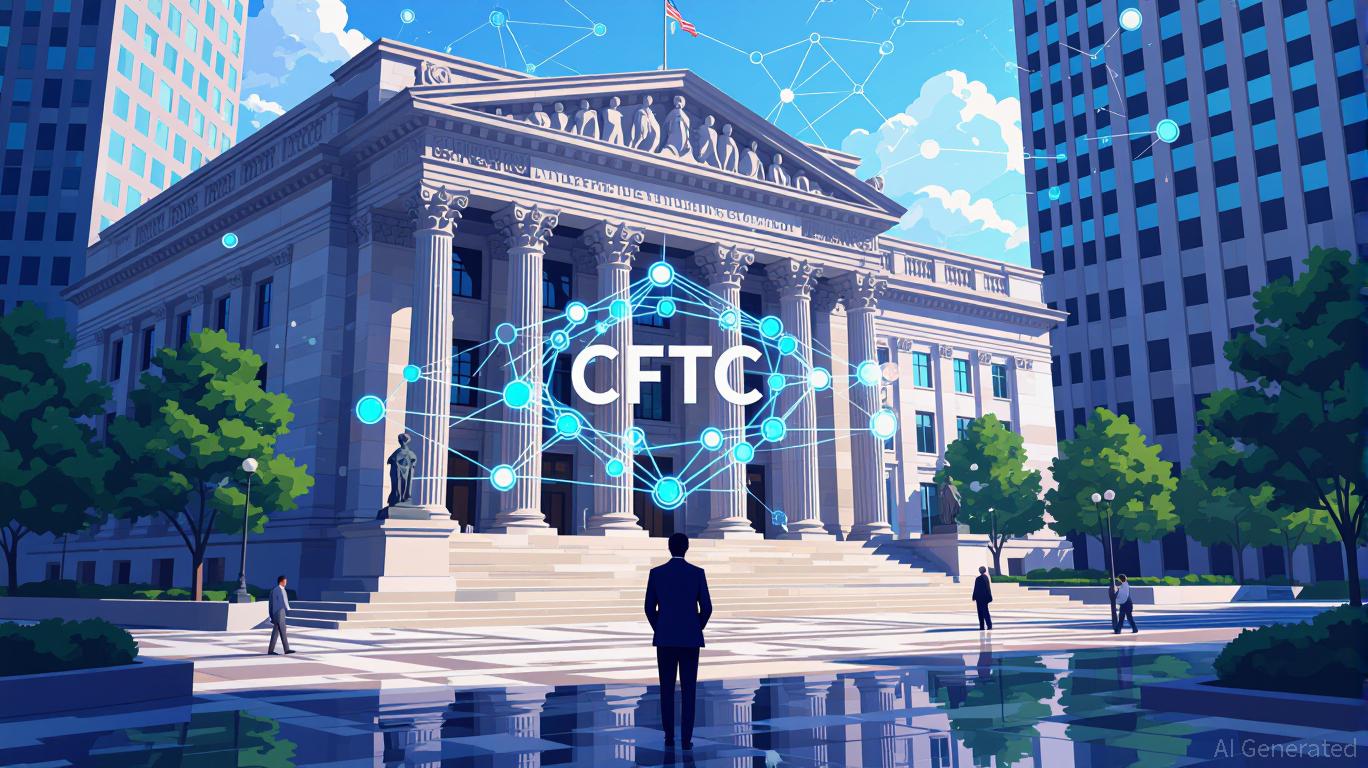U.S. GDP to Get Blockchain Seal for Trust, Trump Era Skepticism in Focus
- U.S. Department of Commerce plans to publish GDP data on blockchain to enhance transparency and trust in official statistics. - Blockchain aims to provide real-time, tamper-evident access for public and private sectors, addressing disputes over data reliability. - Initiative responds to skepticism from President Trump and aligns with global blockchain adoption trends in governance. - Project remains in early stages, requiring technical standards and governance frameworks to ensure scalability and privacy
The U.S. Department of Commerce has announced plans to publish key economic data, including gross domestic product (GDP) figures, on the blockchain. The initiative, disclosed by Commerce Secretary Howard Lutnick during a White House cabinet meeting on August 26, 2025, aims to leverage blockchain technology to enhance the transparency, integrity, and accessibility of official statistics. Lutnick described the project as a pivotal step in modernizing data distribution and expanding blockchain use across government agencies. The department will begin with GDP data and intends to gradually extend the approach to other economic indicators once the initial implementation is finalized.
The decision reflects a broader effort by the U.S. government to integrate distributed ledger technology into public administration. Lutnick emphasized that the initiative will allow the public and private sectors to access tamper-evident data in real time, potentially reducing disputes over data reliability and enabling more robust analytical tools. He also noted that technical details, such as the choice of blockchain platform and metadata standards, are still being finalized. The move is expected to be part of a larger digital transformation strategy that includes collaboration with White House officials and federal agencies to streamline economic reporting.
Blockchain adoption in governance is not new. Countries such as Estonia, France, and Singapore have already implemented blockchain-based systems for public services, including digital identities, cross-border trade, and secure data management. In the U.S., California’s Department of Motor Vehicles recently used a permissioned blockchain to digitize vehicle titles, demonstrating the technology’s potential to reduce fraud and administrative costs. These international and domestic precedents highlight the growing recognition of blockchain’s role in enhancing government transparency and operational efficiency.
The timing of the initiative has sparked discussions about the reliability of U.S. economic data, particularly amid President Donald Trump’s frequent skepticism toward official economic reports. Trump has questioned the accuracy of GDP figures and jobs data in the past, often suggesting that they are influenced or biased. By publishing data on the blockchain, the Department of Commerce may aim to address these concerns by providing an immutable and publicly verifiable record of its statistics. However, while the technology can secure how data is stored and shared, it does not inherently ensure the accuracy of the data itself.
Critically, the initiative is still in the pre-launch phase, with technical and operational details under development. Experts and analysts have highlighted the importance of establishing clear standards for data formatting, network selection, and privacy protections to ensure interoperability and user trust. Additionally, the project will need to consider the environmental impact of blockchain usage and ensure that data publishing remains cost-effective and scalable. The Department of Commerce has not yet released a formal implementation timeline or detailed governance framework, leaving key questions about the project’s long-term structure and oversight.
The potential benefits of this initiative are significant. By anchoring GDP and other economic data on the blockchain, the U.S. government could set a precedent for global data transparency, enabling researchers, journalists, and citizens to verify historical data independently. This could foster greater trust in official statistics and reduce the time and effort required for data validation. As the project moves forward, it will be essential to balance innovation with practicality, ensuring that the implementation supports both government objectives and public needs. The outcome of this initiative may serve as a model for future blockchain-based government services, both domestically and internationally.
Source:

Disclaimer: The content of this article solely reflects the author's opinion and does not represent the platform in any capacity. This article is not intended to serve as a reference for making investment decisions.
You may also like
Aave Horizon: Bridging RWAs and DeFi to Unlock Trillion-Dollar Institutional Liquidity
- Aave Horizon, launched by Aave Labs in 2025, bridges real-world assets (RWAs) with DeFi by tokenizing U.S. Treasuries, CLOs, and funds for stablecoin borrowing. - The $26B tokenized RWA market, led by Ethereum, benefits from Horizon's Chainlink NAVLink oracle, enabling real-time collateral valuation and institutional compliance. - Institutions like BlackRock and JPMorgan leverage Horizon to deploy $19B in capital via arbitrage and leveraged strategies, outperforming traditional finance efficiency. - Regu

Bitcoin's $160K Predicted Rally and the Altcoin Infrastructure Boom: A Strategic Case for Institutional-Grade Cryptocurrencies
- Bitcoin's projected $160K surge by 2025, driven by institutional ETF inflows and regulatory clarity, is catalyzing a broader crypto market transformation. - XRP, ADA, and SOL are emerging as key altcoins with real-world utility in cross-border payments, scalable infrastructure, and institutional-grade DeFi ecosystems. - XRP's commodity status post-SEC ruling and ProShares Ultra XRP ETF's $1.2B inflow highlight its institutional adoption in remittances and DeFi. - ADA's regulatory clarity and Solana's hig

CFTC Leadership Vacuums and Crypto Regulatory Uncertainty: Navigating the New Normal for Institutional Investors
- CFTC's leadership vacuum and reduced enforcement staff hinder effective crypto regulation. - Institutional investors shift to regulated assets like Bitcoin ETFs amid uncertainty. - Policy fragmentation between CFTC and SEC complicates compliance for multi-jurisdictional firms. - Confirming Brian Quintenz and restoring full staffing could address regulatory gaps.

LRC -161.64% 7-Day Drop Amid Market Volatility
- LRC faces intensified regulatory scrutiny with investigations into compliance protocols across key markets. - Strategic shifts include terminating third-party partnerships and prioritizing decentralized infrastructure and open-source development. - Governance upgrades introduce multi-sig models and expanded voting rights to address community concerns over volatility. - Technical upgrades boost network throughput by 20%, aiming to enhance scalability and energy efficiency for long-term competitiveness. -
